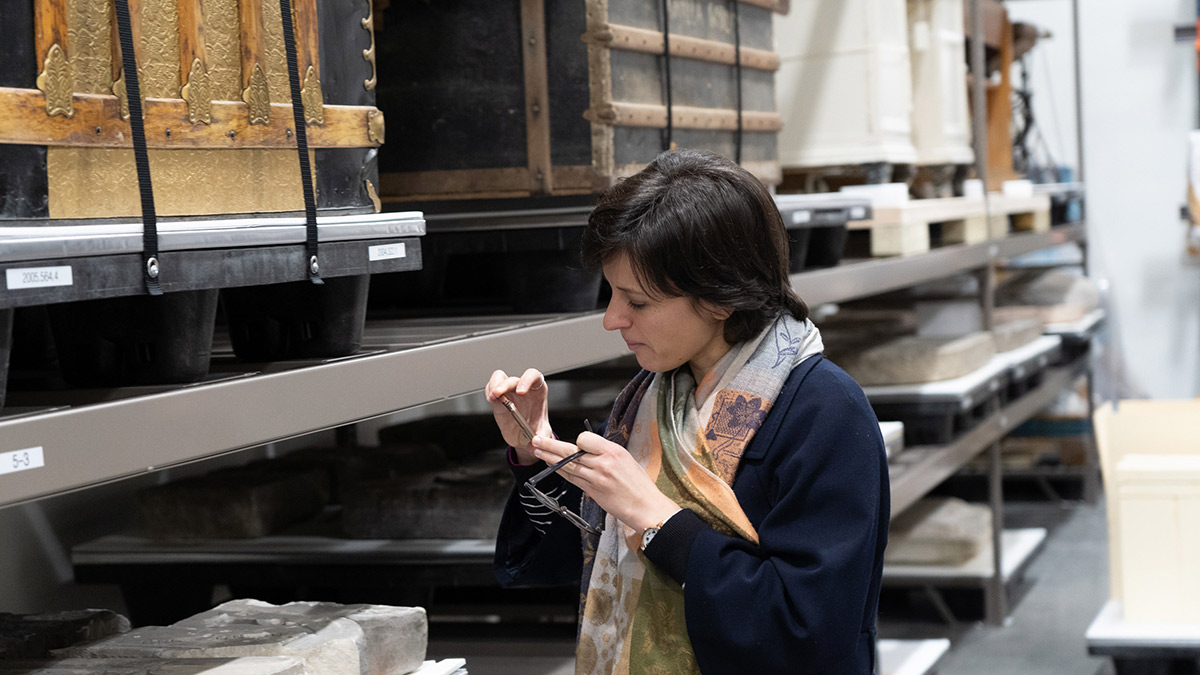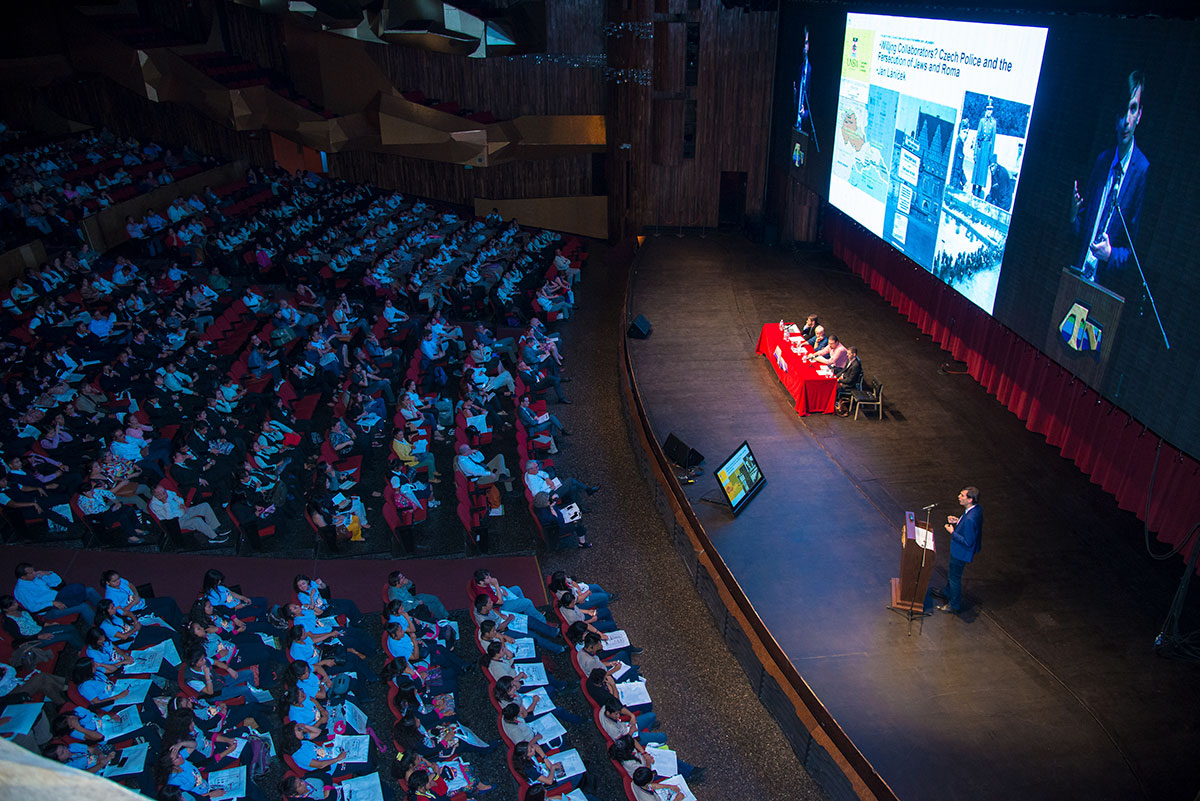My research topic isn’t solely related TO the Holocaust. Should I still apply?
Yes, diversity of research topic, approach, and disciplinary perspective is a primary goal of the Mandel Center for Advanced Holocaust Studies’ fellowship program. We encourage applications for projects on any subject that would benefit from the Museum's archival collections and other resources.
Past project titles include:
- “Writing Postcolonial African Genocides: The Holocaust and Fictional Representations of Genocide in Nigeria and Rwanda,” Chigbo Anyaduba, 2018–2019 J.B. and Maurice C. Shapiro Fellow
- “Stolpersteine and Holocaust Music from the Former USSR,” Alexandra Birch, 2018–2019 Alexander Grass Memorial Fellow
- “‘I Might Have Seen the Ashes of Some of My Brothers’: African American Holocaust Memory and the Resonance of Black Antifascism from World War to Cold War,” Anna Duensing, 2018–2019 Diane and Howard Wohl Fellow
In addition, the Mandel Center welcomes applications from all relevant disciplines. Past fellows have been archaeologists, political scientists, historians, sociologists, anthropologists, and literature scholars, to name but a few examples.
“As an art historian, I have never had access to a set of peers studying and writing about the Holocaust. In addition to the incredible resources available during my fellowship—from the archive to academic talks to the support of staff from across the Museum—I have gained lasting friendships with a group of scholars who have taught me so much.”
–Alissa Schapiro, 2019–2020 William J. Lowenberg Memorial Fellow on America, the Holocaust and the Jews
What is required for a successful application?
Successful proposals highlight the originality of a project and its ability to shed new light on the history of the Holocaust. A key factor in determining fellowship eligibility is the intended use of the Museum’s robust collections. Please note that, if included, a bibliography or list of works cited will count towards the project proposal's limit of five pages.
Proposals should also identify the resources available at the Museum that the applicant wishes to access for their research. An addendum listing these resources may be attached in addition to the five-page project proposal and, in fact, is recommended. Important resources may otherwise be referenced in the body of the project proposal.
When is the application deadline? Am I able to update my application after the application period has ended?
The Mandel Center plans to hold in-person fellowship residencies in Washington, DC in the 2024–2025 academic year. We appreciate applicants' understanding, as the ongoing repercussions of the pandemic may affect the program in a variety of ways, such as our ability to accommodate preferred residency terms. For more information on researching in the archives, please visit the Research in the Museum’s Library and Archival Collections page.
- Applications for the Annual Fellowship Competition must be submitted online by 11:59 p.m. Eastern Standard Time on November 15th.
- Applications for the Summer Graduate Student Research Fellowship Competition must be submitted online by 11:59 p.m. EST on January 15th.
This includes all materials required. We encourage candidates to begin their applications early, as application materials cannot be updated after the deadline has passed. If an applicant wishes to inform the committee of significant developments related to the progress of their career, they may inform us by email and the information will be relayed to the committee.
Does the Mandel Center fellowship program require letters of recommendation?
No. Starting with the 2023–2024 annual fellowship competition, the Mandel Center will not require letters of recommendation.
What is the award process? When will I be notified about the outcome of my application?
Applicants will be notified of the competition outcome by April of the following year, although it is not uncommon to be contacted earlier. The selection committee weighs many factors in the evaluation of a project proposal, including but not limited to disciplinary perspective to ensure a diversity of approach and career level in order to host both graduate students and more advanced scholars together in the same cohort. The specific fellowship and the length of award are at the Mandel Center’s discretion. Staff members are unable to provide feedback on individual applications.
I am not a US citizen. Am I eligible to apply? What does the visa process involve for foreign fellows?
The Mandel Center welcomes applications to the annual fellowship program from citizens of any country. Non-US citizens are required to obtain a J-1 visa in order to be in-residence at the Museum. This process is facilitated by the Museum’s International Exchanges Officer, who provides visa assistance to both fellows and their immediate dependents. At the appropriate time, the International Exchanges Officer will contact an incoming fellow to begin the visa application process. Although we provide visa application assistance, the Museum does not provide additional financial support for a fellow's accompanying family members. The Museum also follows US Department of State guidelines, which require scholars and their dependents to purchase health insurance.
The Museum is unable to provide visa assistance to fellows who are part of the Summer Graduate Student Research Fellowship program.
Does the Museum offer different kinds of fellowships?
Yes, in addition to the Mandel Center’s annual fellowship program for scholars of all career levels, doctoral candidate (ABD) through senior scholar, we also host early-career graduate students for three-month residencies each summer. If you are a master's level or a first-year PhD student, please consider applying for the Mandel Center’s Summer Graduate Student Research Fellowship Program.
Outside of the Mandel Center, the Museum’s Levine Institute for Holocaust Education offers a Museum Teacher Fellowship Program, and the Simon-Skjodt Center for the Prevention of Genocide has its own Tom A. Bernstein Genocide Prevention Fellowship. Please contact these departments directly for further information.
Does the Mandel Center offer health insurance to fellows? What about housing?
No, the Mandel Center does not provide health insurance. Fellows are responsible for their own health insurance. The Mandel Center also does not provide fellows with housing. The Visiting Scholar Programs staff may provide incoming fellows with a housing guide that includes information about Washington, DC and the surrounding area.





